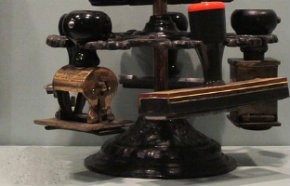Small acts of courage
In the spring of 1939, 47-year-old Paul Grüninger was a middle-level police official in St. Gallen, a picturesque Swiss town near the Austrian border. The son of middle-class parents who ran a local cigar shop and a mediocre student who enjoyed the soccer field more than his studies, Grüninger became an unprepossessing man of quiet conventionality. After dutifully serving time in the Swiss army in World War I, he obtained a teaching diploma, settled into a position at an elementary school, attended church on Sundays and married Alice Federer, a fellow teacher.
To please both his mother and Alice, Grüninger applied for a better-paying position in the police department, a job that involved mainly filling out reports and arranging security details for occasional visiting dignitaries. Or so it seemed.
In April 1939, Grüninger found his way to work blocked by a uniformed officer who told him: “Sir, you no longer have the right to enter these premises.” An investigation had revealed that Grüninger was secretly altering the documents of Jews fleeing Austria for the safety of Switzerland. “Non-Aryan” refugees were not allowed to cross the border after August 19, 1938, but all it took was a few strokes of Grüninger’s pen to predate a passport and perhaps save a life, a small action but one of great personal risk.
Read our latest issue or browse back issues.
Grüninger was dismissed from his position, ordered to turn in his uniform and subjected to criminal charges. The authorities spread false rumors that Grüninger had demanded sexual favors from those he aided. Disgraced as a law breaker and shunned by his neighbors, Grüninger peddled raincoats and animal feed until he died in poverty in 1972.
Paul Grüninger is featured in journalist Eyal Press’s book Beautiful Souls, a study of seemingly ordinary people who exhibited extraordinary and risky courage on behalf of others. This is a book about people like those ambassador Richard Holbrooke once described, who sit at desks with two rubber stamps. Use the one marked “approved,” observed Holbrooke, and a person enters safely into your country. Use the one marked “rejected,” and a person might die or go to prison. In defiance of the rules, and often for fathomless reasons, these people pick up the first stamp.
Their often unnoticed acts of courage are permeated by two great mysteries. The first is why such actions are so uncommon despite the fact that almost every moral system and faith tradition encourages them. Christians are summoned to follow in Jesus’ path, but even when picking up a cross means only picking up the right rubber stamp, many desert and flee. “It is curious,” mused Mark Twain, “that physical courage should be so common in the world and moral courage so rare.”
Acts of moral courage are powerful. I once met a Presbyterian woman in the coal country of Pennsylvania who had made the social misstep of becoming engaged to a Catholic in the early 1930s, a time of hardened Protestant boundaries. Her community turned its back on her. Conversations ended when she approached people. She would never forget, she said, the Sunday when a respected woman in her congregation, in bold defiance of prevailing attitudes, publicly embraced her and wished “every blessing of God” on her and her marriage. It was a small act of courage, but one cherished nearly 60 years later.
Motivation is the second mystery. “At the center of our moral life,” said Susan Sontag, “are the great stories of those who have said no.” But why do ordinary people sometimes summon the courage to resist in the face of great societal pressure?
Press raises this question over and again in his book. “Beautiful souls,” he found, were neither moral nor spiritual virtuosi, nor were they iconoclasts who by temperament flaunt society’s values. To the contrary, they were truly ordinary people who believed so firmly in a vision of a just world that its values seemed inviolable.
Theologian Arthur McGill said it is of little use to urge people to be brave or selfless. “Whether people serve themselves or serve others,” he said, “is not in their power to choose. This is decided wholly in terms of the world in which they think they live. . . . In New Testament terms, they live or die according to the king that holds them and the kingdom to which they belong.”
Paul Grüninger was not Braveheart. He was an unassuming man whose family and faith formed him in a world—a kingdom, if you will—in which anyone who saw what he saw, “the heartbreaking scenes . . . the screaming and the crying of mothers and children . . . could not bear it anymore . . . could do nothing else.”
Paul and Alice are buried together near St. Gallen. Seventy years later a plaque was placed at the foot of Paul’s grave. It reads: “Paul Grüninger saved hundreds of refugees in 1938/39.” At his funeral, a choir sang “Nearer My God to Thee,” and a rabbi read from the Talmud: “He who saves a single life, saves the entire world.”






